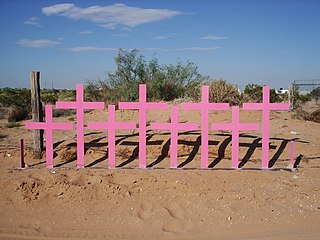Related Research Articles

More than 500 women were killed between 1993 and 2011 in Ciudad Juárez, a city in northern Mexico. The murders of women and girls received international attention primarily due to perceived government inaction in preventing the violence and bringing perpetrators to justice. The crimes have featured in many dramas, songs, and books.

Jerry Ricardo Bengtson Bodden is a Honduran professional footballer who plays as a striker for Olimpia and the Honduras national team.
Articles 108 through 108-C of the Penal Code of Peru define crimes similar to those known as murder in Anglophone countries. The term asesinato ("murder") is no longer used in the Penal Code since 2014.

Susana Chávez Castillo was a Mexican poet and human rights activist who was born and lived most of her life in her hometown of Ciudad Juárez.
Ángel Alfredo Villatoro Rivera was a Honduran journalist and radio personality, who was kidnapped and killed in 2012 and is regarded as a "journalist martyr". He was one of the seven journalists killed in Honduras in 2012.

Berta Isabel Cáceres Flores was a Honduran (Lenca) environmental activist, indigenous leader, co-founder and coordinator of the Council of Popular and Indigenous Organizations of Honduras (COPINH). She won the Goldman Environmental Prize, one of the most prestigious awards for environmental activism, in 2015 for "a grassroots campaign that successfully pressured the world's largest dam builder to pull out of the Agua Zarca Dam" at the Río Gualcarque.

Marlon Tábora Muñoz is a Honduran politician and diplomat, a PhD in economic sciences, and a member of the National Party of Honduras. Previously Tábora has been Honduras Ambassador to the United States and also worked as Executive Director for Central América and Belize at the Inter-American Development Bank and Counselor Minister of Economic and Energy Affairs of the President Juan Orlando Hernández
The Council of Popular and Indigenous Organizations of Honduras (COPINH) is a Honduran organization founded in 1993, dedicated to the defense of the environment in Intibucá and the defense of the indigenous Lenca people.

Femicides in Peru are murders committed against women in Peru, a country in South America, which experiences high levels of violence against women. Between 2010 and 2017, 837 women were murdered and 1,172 murder attempts were made. Updated numbers between 2015 and 2021 showed and increase in femicides, with 897 women being killed in Peru during the period.

Laura Zúñiga Cáceres is a Honduran human rights and indigenous rights activist.
Lesbia Yaneth Urquía was a Honduran human rights activist. She was an advocate for the environment.
On 11 February 2020, Fátima Cecilia, a seven-year-old girl, disappeared, and four days later, on 15 February, was found dead in a garbage bag in a vacant lot in Tláhuac, Mexico City, Mexico with signs of physical violence and sexual abuse. The murder of Fátima has caused commotion in Mexico.

On 9 February 2020, Ingrid Escamilla Vargas, a 25-year-old woman living in Gustavo A. Madero, Mexico City, was murdered by her boyfriend, Erik Francisco Robledo Rosas in an act of femicide. Robledo was convicted and sentenced to the maximum penalty of 70 years in prison.
Guadalupe Campanur Tapia was an indigenous Mexican environmental rights activist. She was one of the indigenous leaders of Cherán who mobilize the population to defend he forest against illegal logging. In 2018, she was remembered by the UN Women.

Isabel Agatón Santander is a Colombian poet, lawyer, writer and feminist. Promoter of the Rosa Elvira Cely Law which defines femicide as a crime in Colombia, she integrated the editorial commission of Law 1257 of 2008 about violence against women. She was a judge in the Tribunales de Conciencia de Justicia Para las Mujeres in Nicaragua (2015) and El Salvador in which they tried cases of sexual violence and femicide convened by the Red Feminista frente a la Violencia contra las Mujeres (REDFEM) and the Red contra Violencia of the respective countries.

An antimonumenta was installed in the Plaza de Armas, in Guadalajara, Jalisco on 25 November 2020, the date commemorating the International Day for the Elimination of Violence against Women, during the annual march of women protesting against gender violence. The sculpture is symbolically named Antimonumenta and it was inspired by the anti-monument of the same name placed in Mexico City a year prior.

Mabel Lozano is a Spanish writer, model, film director, film and television actress and activist in defense of women's rights. In her work she denounces the sexual exploitation of women through prostitution and trafficking. In 2021 she received the Goya Award for best documentary short film for Biografía del cadáver de una mujer.
Richard Choque Flores is a Bolivian serial killer and rapist who killed at least two women in 2021, shortly after being released from a prior conviction. For the latter crimes, he was sentenced to 30 years imprisonment.
Efraín Sarmiento Cuero, known as The Beast, is a Colombian serial killer and rapist who murdered at least three women across various regions from 2017 to 2023. He achieved notoriety in 2023, after murdering his girlfriend during a prison visit, where he was serving prison sentences for two separate murders.
References
- 1 2 "Cerca de 4.000 mujeres fueron asesinadas en Honduras entre 2002 y 2013". Elmundo.es.
- ↑ "Más de 3,600 mujeres fueron asesinadas en Honduras entre 2002 y junio de 2013". América Latina – ElNuevoHerald.com. 10 September 2014. Archived from the original on September 10, 2014.
{{cite web}}: CS1 maint: unfit URL (link) - ↑ Gibbons, Jonathan (2013). "Global Study on Homicide" (PDF). Unodc.org. United National Office of Drugs and Crime (Vienna).
- ↑ "Los asesinatos de mujeres aumentan un 65 por ciento en Honduras". Laprensa.hn.
- ↑ "Una interminable "epidemia" muerte de mujeres en Honduras". Laprensa.hn. Archived from the original on 2016-08-09. Retrieved 2016-06-13.
- ↑ Honduras Stakeholder Report for the United Nations Universal Periodic Review. Minneapolis: The Advocates for Human Rights. 2019. p. 2.
- ↑ Visit to Honduras Report of the Working Group on the Issue of Discrimination Against Women in Law and in Practice. United Nations General Assembly. 2019. p. 5.
- ↑ Mujeres, Centro de Derechos de. "¿Cuál será el impacto del nuevo Código Penal en los derechos de las mujeres en Honduras? | Centro de Derechos de Mujeres" (in European Spanish). Retrieved 2019-02-07.[ permanent dead link ]
- ↑ Refugees, United Nations High Commissioner for. "Honduras: Death of Riccy Mabel, July 1993". Refworld.org.
- ↑ Controlador. "Mártires de la lucha ambiental". Archived from the original on 2013-09-21.
- ↑ "Honduras ante la corte interamericana por el asesinato de ambientalista". Honduras Laboral. 16 April 2015. Archived from the original on April 16, 2015.
{{cite web}}: CS1 maint: unfit URL (link) - ↑ "Testigos identifican a Plutarco como el asesino de Miss Honduras y su hermana, en audiencia inicial". Archived from the original on 2015-02-12. Retrieved 2016-06-13.
- ↑ "Asesinato de reina; shock para violenta Honduras". Huffingtpnpost.com.
- ↑ "Dictan prisión para Plutarco Ruiz por el asesinato de Miss Honduras Mundo y su hermana". Canalntn24.com.
- ↑ "Threats, attacks and intimidation against Berta Cáceres Flores". BertaCaceres.org. Archived from the original on 2019-10-24.
- ↑ "Secretario de la OEA condena asesinato de Berta Cáceres". La Tribuna. 3 March 2016. Archived from the original on 2 April 2016. Retrieved 2016-03-04.
